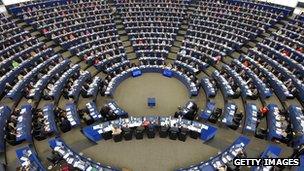European trade committee votes to reject piracy treaty
- Published

MEPs on a key European parliamentary committee have voted to reject the Anti-Counterfeiting Trade Agreement (Acta) by 19 votes to 12.
Many regard it as the deathblow for the controversial treaty because the trade committee formally recommends how to vote to the wider parliament.
The European Parliament vote is due to take place in July.
Acta aims to tighten rules on both online and offline piracy but has attracted many critics.
One of its harshest detractors has been UK MEP David Martin, the lead member of the committee.
Speaking after the Inta vote, he said: "This was not an anti-intellectual property vote. This group believes Europe does have to protect its intellectual property but Acta was too vague a document," he said.
He said that it "left many questions unanswered", including the role of ISPs in policing the internet. He also said that many on the committee felt that the sanctions for breaches of copyright were "disproportionate".
"In the end it came down to vote on intellectual property or civil liberties and I'm glad that civil liberties won over," he said.
If the European Parliament voted to reject Acta, it will be scrapped.
Responding to the vote Peter Bradwell, a campaigner with the Open Rights Group, said: "MEPs have listened to the many, many thousands of people across Europe who have consistently demanded that this flawed treaty is kicked out.
"This is the fifth consecutive committee to say Acta should be rejected. It now falls to the vote of the whole European Parliament in early July to slam the door on Acta once and for all, and bring this sorry mess to an end."
But a group of more than 130 organisations representing European industry have urged the European Parliament to wait for the opinion of the Court of Justice of the European Union (CJEU) before taking a final decision on the Treaty.
"The majority of jobs in our knowledge-based societies rely on intellectual property. Counterfeiting and piracy, including on the internet, are creating a global black market threatening the economic basis of real jobs in the creative industries. It's a global problem that needs a global response. We need a tool like Acta," said Johannes Studinger, head of UNI MEI, a global union for the Media, Entertainment and Arts industries.
- Published31 May 2012
- Published24 April 2012
- Published16 April 2012